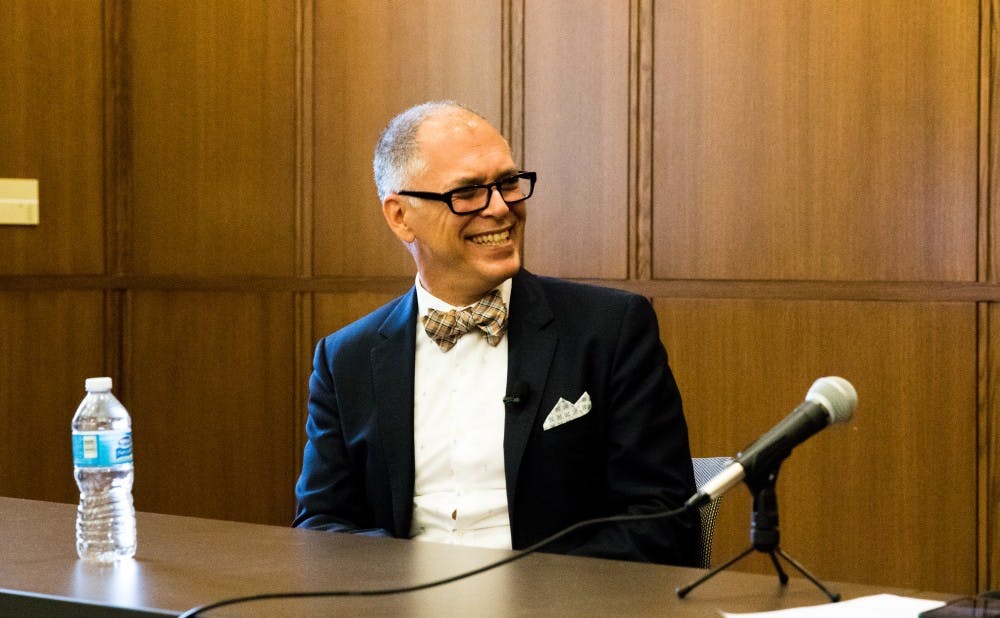Jim Obergefell, the lead plaintiff in the Supreme Court case that legalized same-sex marriage in all 50 states, visited Duke for a conversation about his life, work and the problems that need to be tackled next.
Senior Steven Soto, president of Blue Devils United, and Skye Wilson, a program coordinator for the Center for Sexual and Gender Diversity, led the conversation with Obergefell about his new life and work as a self-described "accidental activist." A crowd of about 60 attended the event in the Holsti-Anderson Family Assembly Room in Rubenstein Library.
“I really felt like, for me, this case had a huge impact on my own coming out, and it just made a more welcoming environment for queer people in general,” sophomore Luke Longo, who attended the talk, said.
Born and raised in Ohio, Obergefell was the last of six children in a Catholic family. While in graduate school at Bowling Green State University, he came out as gay. He met and fell in love with John Arthur in 1992, which he described as "love at third sight." The couple decided to marry in Maryland in 2013, while Arthur was bedridden with the motor neuron disease amyotrophic lateral sclerosis, after a diagnosis in 2011. Following Arthur’s death, Obergefell began a legal battle to be recognized as the surviving spouse on Arthur’s death certificate. His case eventually went to the Supreme Court as Obergefell v. Hodges. The Court ruled in June 2015 that the Constitution requires states to permit same-sex marriage.
Obergefell shared personal anecdotes about the case and intimate aspects of the journey behind the Supreme Court decision.
"It was by virtue of an unexpected meeting with a local civil rights attorney that we decided to file suit against the state of Ohio, to demand recognition of our marriage after his impending death certificate," Obergefell said. "And that took me all the way to the Supreme Court.”
Suing the state, much less having a Supreme Court case, was not something he ever believed he would end up doing, he said. Making the decision to file against Ohio was easy, he explained, because it was the right thing to do and because he and Arthur were fighting for their love and marriage.
Obergefell described the many issues he and his team had to overcome but also noted that he was surprised at the overwhelming positive support he received.
“One of the really surprising things is, in the course of over two years, from when we filed the suit to the Supreme Court decision, I got four pieces of mail that were less than supportive. That was it, four,” Obergefell said. “And counteract that with the hundreds of thousands of letters, cards, emails, people stopping me on the street wherever I go, thanking me and explaining why our fight is important to them or someone they love."
He noted that he thinks his story resonates with others, which created protection for him.
The conversation also touched on how the marriage equality movement is seen as a white male movement by some. Many attendees agreed.
“I’m really glad that [Obergefell] recognized that his own identity has some influence in this movement, being a white male," Longo said. "It’s really important to recognize that the queer community can encompass people of all identities.”
Obergefell explained the importance of continuing to confront issues involving sexual and gender identity.
“There are positive things happening, but until we change society’s attitudes in general, you know, no kid should be kicked out because they tell their mom or dad that they’re gay or lesbian," he said. "That’s what we need to fix and that takes time."
Obergefell came to Duke as a stop on his book tour for "Love Wins," which he co-authored with Debbie Cenziper. The book documents the Supreme Court case and the groundbreaking decision through behind-the-scenes moments and insider accounts.
Longo noted that hearing Obergefell speak added another dimension to the Supreme Court ruling.
"I was constantly holding back tears," he said. "It makes me feel so connected to this case and really makes it so personal."
Although the N.C. Pride Parade will be held Saturday on East Campus, Obergefell will be unable to attend because he is flying out to marry a couple in Columbus, Ohio.
Obergefell ended by telling the the audience to always be proud of who they are.
“Find those people who love you, no matter what,” he said.
Get The Chronicle straight to your inbox
Signup for our weekly newsletter. Cancel at any time.

